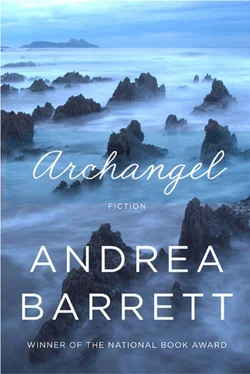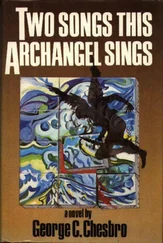To the professor, only a few feet away, his wife called, “Cyanea!”
In response, he seized an oar from the student rowing his boat and used it to spin the bow around, nosing it into the side of the creature until only the huge disk of jelly separated his boat from Henrietta’s. He signaled the remaining boats to nose in similarly, forming a rough ring.
“It’s too heavy to bring into our boats with the equipment we have,” he said. “And too fragile — its own weight would tear it apart as we tried to lift it. But we can look at it closely from here.”
Those who could peered down at the water, some measuring the diameter — at least four feet, they agreed — others inspecting the lumpy ovaries, the mouth parts, the eye specks around the rim. The tentacles, the professor pointed out, were despite their apparent confusion actually gathered into eight distinct bunches. He directed one boat to back slowly away from the circle, following a set of tentacles until they disappeared — which was not, they found to their amazement, for thirty feet. The fair young rower, his face spattered with freckles, lifted his oar and showed the trailing ends draped across the blade. Meanwhile the professor continued to point out the structural similarities between the Cyanea and the Aurelia .
Daphne raised her head from the mass of blubber and addressed the professor. “That’s intriguing,” Daphne said. “Those resemblances, those affinities, might well be seen as evidence that the two forms are related, sharing descent from a common ancestor.”
The professor shook his head. “You are alluding to Mr. Darwin’s theories, I know,” he said.
Of course he knew, Henrietta thought. He was tired and old, but he knew what they were reading, as he knew that Daphne was challenging him. Perhaps he even knew he was wrong, but still he had to repeat his old lessons. How wearying this was! She wanted what he himself had told her to seek: the really real world. Before he could say anything else, Henrietta leaned over and thrust her hands into the water, toward the Cyanea . The surface felt smooth, surprisingly elastic yet yielding easily to the pressure of her hand. She slipped her left hand from the rounded body into the mass of soft tentacles. Almost instantly her hand began to sting and prickle, and then to burn. With a cry she pulled it out and sat up.
“Oh dear,” the professor’s wife murmured. “I should have warned you — the name Acalephs alludes of course to their stinging or nettle-like properties. That won’t cause any lasting damage, but you’re going to be uncomfortable for a few hours.”
The professor, looking across the blubber still poised calmly, apparently guiltless, among the surrounding boats, asked if Henrietta was all right.
“Fine,” she said unsteadily. The pain was beginning to ebb but so too was all the sensation in her hand. As it grew numb, the pain moved into her head.
“I’ve done that myself,” the professor said. “Just out of curiosity, as an experiment.” To the other students he explained that the stinging sensation Henrietta had experienced, and the numbness now creeping over her hand and wrist, had been caused by the myriad tiny cells, called lasso cells, that lined each of the twisting tentacles. “Each of these cells contains within it a tiny, tightly coiled whip, so fine we can hardly see it,” he said. “And each whip can be shot out, at the will of the animal, to sting its prey or — as Miss Atkins has so clearly but unfortunately just found — to defend against an attack. In concert, the whips act almost like a galvanic battery, paralyzing small prey and rendering a larger opponent at least partially helpless for a while.
“Now, to address your Mr. Darwin’s arguments”—he gestured toward Daphne—“he himself has said that his theory would break down if it could be demonstrated that any complex organ existed which could not have been formed by numerous successive slight modifications. This is a perfect example. How could such a complex mechanism as a lasso cell have developed gradually, in tiny steps, by so-called ‘natural selection’? What possible use could half a lasso cell be, a filament that uncoiled but didn’t sting, or one that stung but couldn’t uncoil? How could such useless half-parts be ‘selected’? All the parts have to work in concert for the mechanism to work at all — and they could not work so well and precisely together unless they had all been designed at once by a Divine Intelligence.”
As he spoke the Cyanea contracted, its circumference shrinking as if it were pulling in its skirts. Deep in the blubber Henrietta dimly saw knotted strands and loops, like the delicate assemblages in the Aurelia grown heavy and gross. If the professor was right, the Divine Mind had, for its own pleasure, worked the same pattern on two different scales. If Daphne and Mr. Darwin were right, the pattern repeated because the creatures were related. Affinity represented either descent, on Mr. Darwin’s theory, or God’s delightful repetition with variety, on the professor’s, whereas analogy — did she have these definitions right? — was an accidental correspondence related to function, a bat’s wing superficially like a bird’s, a whale’s tail superficially like a fish’s. The sea blubber heaved again, writhed as if it were in pain, and then sank out of sight. Henrietta leaned over and vomited into the water.

AFTERWARD, THE PROFESSOR was badly shaken. He’d been perfectly calm, as always; his wife had wiped the student’s face and wrapped her hand in a damp cloth and they’d carried on with the lesson for a few more minutes before turning the fleet around and heading for shore. They’d acted, he and his wife, François and Arnold and the others, as if nothing surprising had happened, as if there was nothing unusual in a student carelessly poisoning herself. After all, she was known to be clumsy; on their first excursion to the grotto, only she had cut herself on the barnacles. They’d all been frightened, though. And even after her color returned, her evident pain and confusion had made him feel terrible.
Not to François, not to Arnold, not even to his wife had he confided the hopes he’d had during the first few weeks of the session. Back on the mainland, on the rainy evening when she— Henrietta Atkins , he remembered, and then forgot — when she had entered the hotel lobby, her hair dripping wet, so young and frightened and eager that, when she introduced herself to him, her voice was shaking, he’d sensed instantly that she might stick by him. Forty years of teaching had given him an instinct for the one or two in each crowd who, not necessarily the most quick-witted or the most skilled manually, learned deeply, thoughtfully, out of an eagerness to please. Eventually most of them turned from the path, they became disloyal, something in them began to doubt as they grew older — but how wonderful they were at first! He’d been longing for a new disciple. During the three days before the other students came, he’d watched Henrietta closely. He’d seen how quickly she adopted his wife’s rhythms and movements; how she listened intently to every word about his work. Oh, he could have taught her everything! Then through his own mistake, through pairing her with that Daphne, he’d ruined it all.
With her yellow hair heaped atop her tiny body, and her face all points and lines, Henrietta’s annoying partner looked to him like a wizened child. What about sexual selection? she asked, bringing up Mr. Darwin’s theories no matter what they were observing. About succession in time and space, variation under domestication, the evidence of embryology? That her dissections were impeccable, her drawings elegant and accurate, only made matters worse. Without her, Henrietta wouldn’t have succumbed to Mr. Darwin’s theories. Without this very bad influence, she would have listened attentively to him, learned some useful portion of what he knew; gone home after this experience ready to spread his teachings.
Читать дальше













